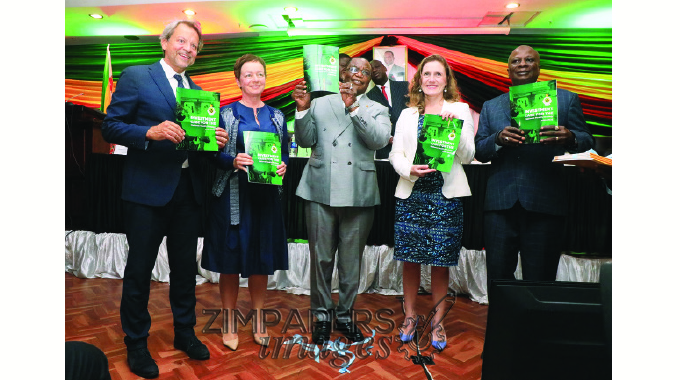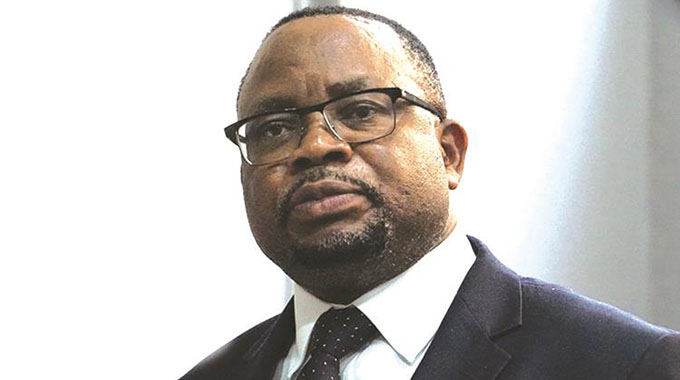VP launches health strategies

Rumbidzayi Zinyuke-Senior Health Reporter
Government and its partners have set in motion strategies that will increase the reach of millions of Zimbabweans to healthcare services in line with the vision for universal access to health services as enshrined in the National Development Strategy 1.
To this end, Vice President and Minister of Health and Child Care Constantino Chiwenga yesterday launched the Health Resilience Fund (HRF), the National Health Strategy (2021-2025), the Investment case for the National Health Strategy and the Coordination framework for the health sector.
The HRF, which succeeds the Health Development Fund (2016-2022), is a pooled health fund with financial commitments of about US$90 million over the next 3 years. It is being rolled out with financing from the European Union, the Governments of Ireland, the United Kingdom, and Gavi, the Vaccine Alliance. UNICEF, UNFPA and WHO are the technical partners of the Fund which is expected to contribute to the improvement of health care for vulnerable mothers, newborns, children and adolescents in Zimbabwe.
Launching the Fund and strategies, VP Chiwenga said collaboration was fundamental in the achievement of good health outcomes for all.
“Today, we are gathered here to celebrate the official closure of the Health Development Fund. Ladies and Gentlemen, the closure signifies the birth of a renewed and strengthened cooperation under the Health Resilient Fund. As the name suggests, this fund is designed to ensure a resilient and sustainable health system. The challenges and lessons learnt were critically analysed to come up with bankable health interventions cognisant of the scarcity of resources, and the need for improved efficiency in our programming,” he said.
He commended the HDF for assisting the Ministry in reducing the high maternal and under-five mortalities while the interventions implemented under the Fund had addressed health systems bottlenecks.
The Vice President expressed the Government’s commitment to supporting the implementation of the Health Resilience Fund programme in the same way it had supported its predecessor programmes.
“I would like to assure you that the funds you have pledged will be used efficiently and effectively as the Government remains focused on achieving the highest standard of health care and quality of life possible for all its citizens,” he added.
The Health Resilience Fund will build on the gains of the Health Development Fund and address the remaining challenges to ensure access to maternal, child and sexual and reproductive health and nutrition services, and to strengthen the health system’s resilience to shocks.
The National Health Strategy (2021–2025) is a deliberate effort by the Government to improve the health and wellness of the population and to ensure universal access to health services, whilst the Investment Case to the National Health Strategy (2021–2025) calls for efficiencies in the utilisation of available health resources. The Health Sector Coordination Framework consolidates and coordinates shared efforts by the Ministry of Health and Child Care and all key stakeholders to improve sector governance and oversight.
UN resident coordinator Mr Edward Kallon said both the HDF and its successor the HRF were synergising and building on national health investments, all of which were contributing to reducing maternal mortality and under-5 mortality.
“This unique health initiative, the result of co-creation among partners, will also impact positively on other sectors; education, WASH, gender equality and equity, job creation, thus enabling the achievement of other SDGs, including strengthening the resilience of the people of Zimbabwe,” he said.
European Union Ambassador to Zimbabwe Mr Jobst von Kirchman said the EU had committed US$45 million over the three years to the HRF.
“A healthy population is the engine of a country’s economy. When we are healthy, we are stronger, we can achieve better economic growth, we can do better…If the population is in good health, the country will thrive,” he said.
He said the EU’s support towards health in its partner countries was meant to help create a more equitable and just global society adding that the new Fund would support the Ministry of Health to build a strong health system that guaranteed every Zimbabwean access to comprehensive and appropriate quality health services at all levels.
“In line with the mantra of President Mnangagwa that ‘nyika inovakwa nevene vayo’, it’s important to increase public spending in the health sector for the attainment of universal health coverage that ensures no one and no place is left behind. We know the Government is working to reduce donor dependency and improve sustainability and we, along with other development partners, will support the Government in developing an exit strategy and ensuring that quality service delivery is achieved in the long run,” said Mr Kirchman.
British Ambassador to Zimbabwe Melanie Robinson said the Health Development Fund had touched the lives of many Zimbabweans in the face of a series of crises that included Cyclone Idai and Covid-19 pandemic among others.
Irish Ambassador to Zimbabwe Fionnuala Gilsenan it was important to recognise the huge residual burden that the Covid-19 pandemic still placed on health systems and healthcare workers across the world.
“We look forward to strengthening linkages with all our partners across the Government of Zimbabwe and with UN agencies to ensure that the work of the HRF complements the essential work of the Ministry of Women’s Affairs and other Departments in advancing gender equality,” she said.
Government has been working towards increasing Government spending on health to achieve the 15 percent of the national budget as stipulated by the Abuja declaration. In the 2023 budget, allocation towards health increased from 10,6 percent in 2022 to 11,2 percent.
Unicef Zimbabwe country director Dr Tajudeen Oyewale said the HRF was an effective tool to pool health investments to the most vulnerable both in urban and rural settings.
“Working with health partners in alignment with the Government will help address the remaining challenges and strengthen the health systems at large” he said.
“I would like to congratulate the Government of Zimbabwe and the Health Resilience Fund partners, on this important effort towards achieving the set health goals in the National Development Strategy (NDS1) of the Government of Zimbabwe. This support is a clear demonstration of the how we are linking partnerships with national strategy to achieve sustainable national results.”









Comments